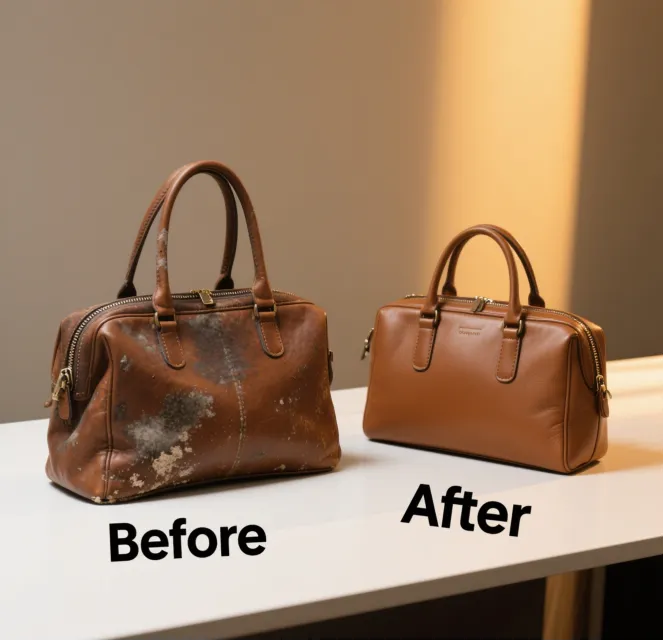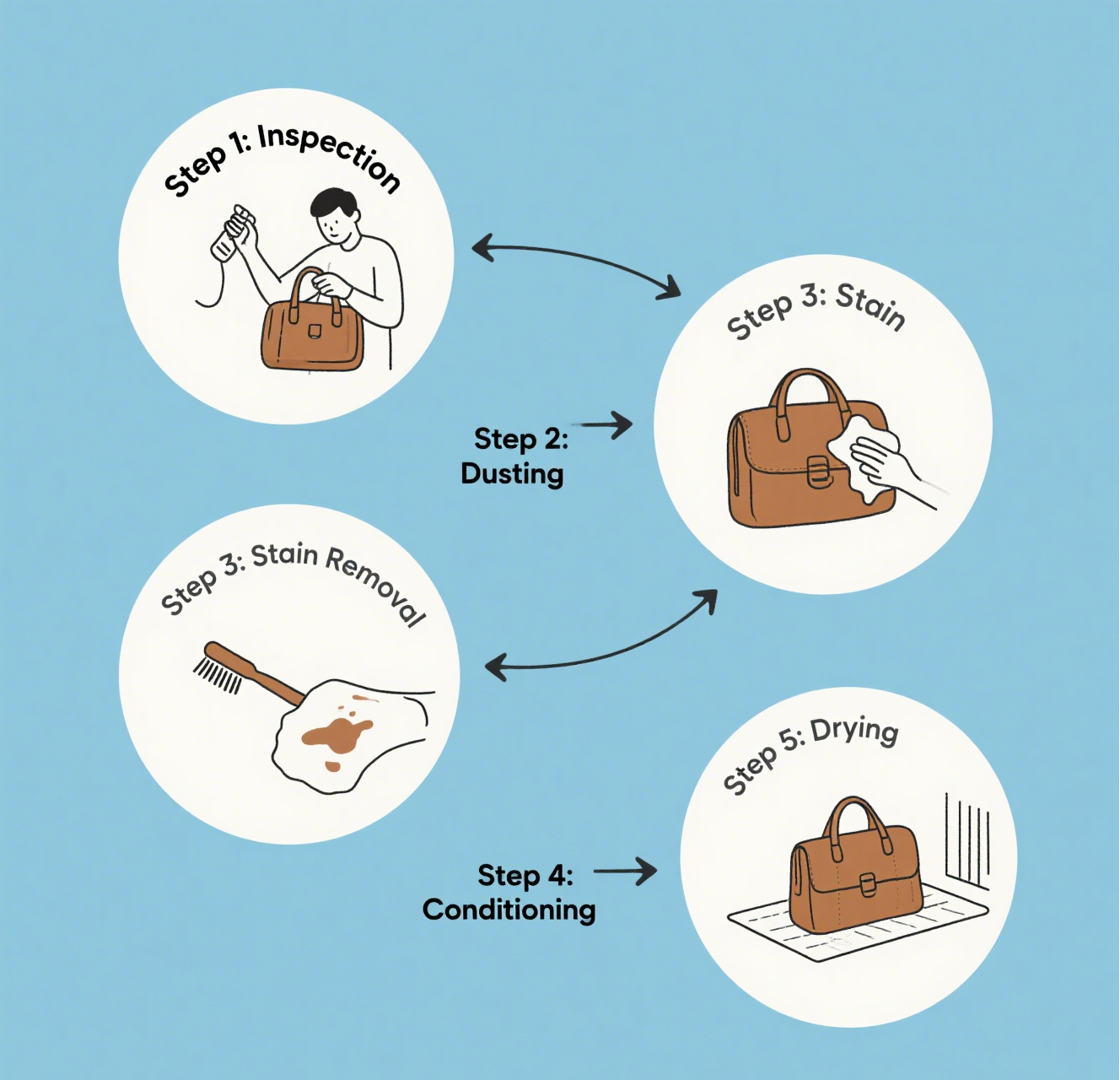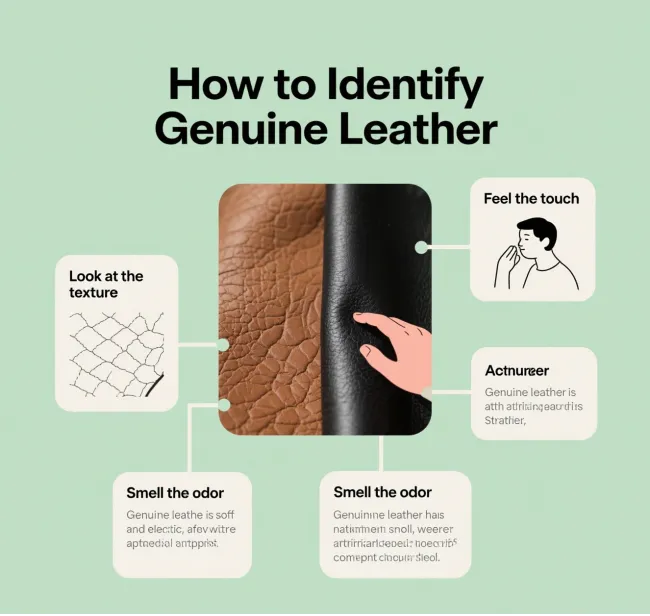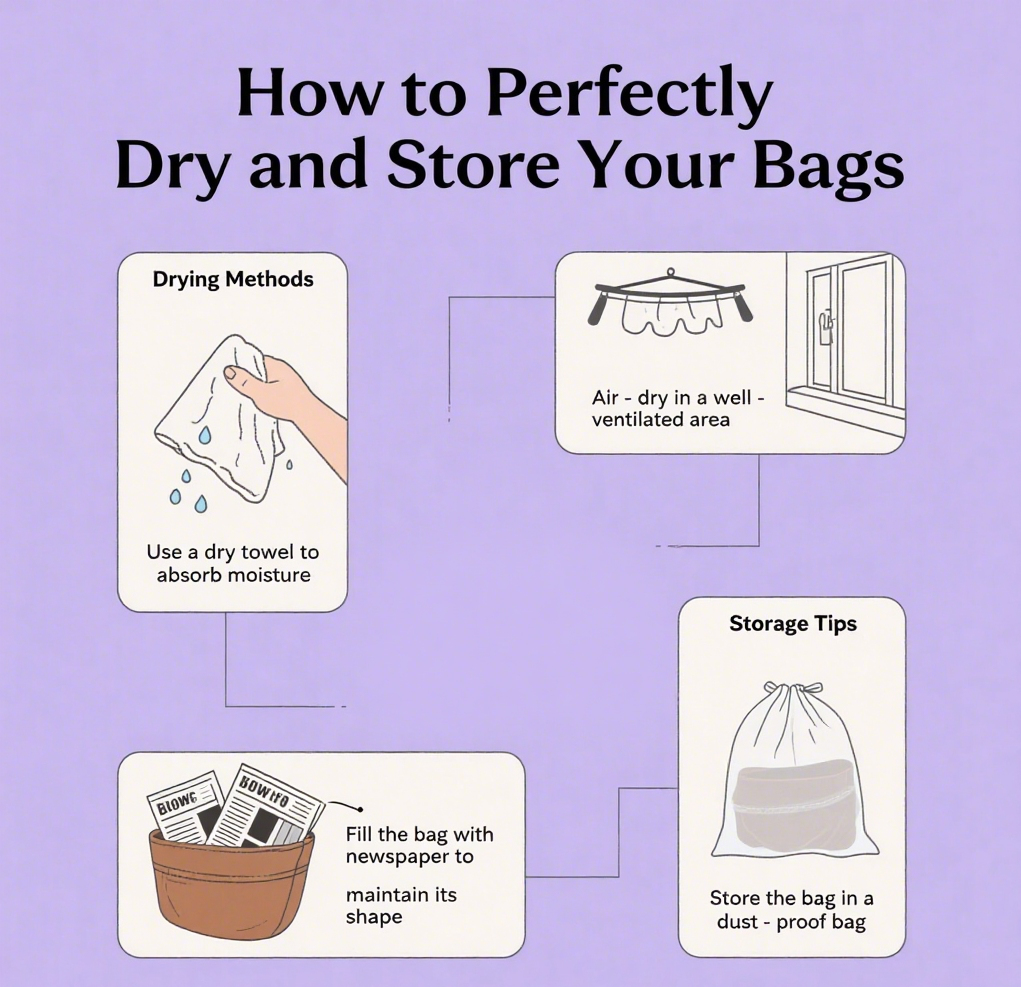Your customers invest in beautiful leather bags for their timeless elegance, unmatched durability, and luxurious feel. However, even the highest quality leather requires dedicated care to maintain its pristine appearance over years of use. Everyday challenges like accidental spills, dust accumulation, and environmental grime are inevitable. Providing clear, actionable advice on how to clean leather bag items safely is a cornerstone of exceptional after-sales service. This guidance prevents well-intentioned owners from resorting to harsh, damaging methods, thereby preserving the bag's intrinsic value and ensuring their continued satisfaction with your brand. This comprehensive guide empowers them with professional techniques essential for mastering how to clean leather bag maintenance long-term.
1.Essential Supplies for Gentle & Effective Cleaning

Before addressing any dirt or stain, assembling the correct tools is critical. Using inappropriate products is a primary cause of leather damage.
- Soft, Lint-Free Cloths: Microfiber or 100% cotton cloths are ideal. Avoid paper towels or rough fabrics that can scratch.
- pH-Balanced Leather Cleaner: Crucially, use a cleaner specifically formulated for leather. Harsh detergents or household cleaners strip natural oils. Match the cleaner to your bag's type.
- Lukewarm Water: Only use slightly warm water. Hot water can cause shrinkage and discoloration.
- Soft-Bristled Brush (Optional): A horsehair detailing brush is excellent for gently lifting dirt from textured leathers like pebbled grain or nubuck.
- The Golden Rule: Test First! Always apply any cleaner or conditioner to a small, inconspicuous area (like inside a pocket seam) and wait 24 hours to check for adverse reactions.
Starting with the right supplies is the absolute foundation for learning how to clean leather bag surfaces correctly and safely.
2.Step-by-Step: The Safe Leather Bag Cleaning Process

Following a meticulous method ensures thorough cleaning without risk. Patience and gentleness are key.
- Step 1: Dry Removal First. Gently brush away any loose dirt, dust, or debris using a soft brush or dry cloth. This prevents scratching during the wet clean.
- Step 2: Prepare Your Damp Cloth. Lightly dampen your soft cloth with lukewarm water. Crucially, wring it out thoroughly until it’s only slightly moist. Leather is easily damaged by excess moisture.
- Step 3: Apply Cleaner to Cloth, Not Bag. Put a small amount (pea-sized to start) of your pH-balanced leather cleaner onto the damp cloth. Never apply cleaner directly onto the leather.
- Step 4: Gentle Circular Motions. Working on one small soiled area at a time, use minimal pressure and gentle circular motions with the cloth. Avoid vigorous scrubbing.
- Step 5: Wipe Clean Immediately. Before the cleaner dries, use a clean, slightly damp section of your cloth (or a second damp cloth) to gently wipe away any residue.
- Step 6: Buff to Shine. Finally, use a completely clean, dry, soft cloth to gently buff the cleaned area to a soft sheen.
This systematic approach is the professional secret for how to clean leather bag exteriors effectively without compromising the material.
2.1 Understanding the Material: Why Types of Leather for Bags Dictate Care
In the previous article, we mentioned the
types of leather for bags. If you are interested, you can refer to it.Leather is not a uniform material. Care varies significantly based on its finish and treatment. Full-grain leather, the most durable, showcases natural markings but requires specific conditioners. Top-grain leather is sanded for a smoother look but is slightly less robust. Delicate types of leather for bags, like suede and nubuck, have a soft nap that demands specialized soft brushes and cleaners to avoid matting or discoloration. Patent leather needs cleaners that won't dull its high-gloss finish and can be prone to cracking if dried improperly. Aniline leather is highly absorbent and particularly sensitive. Always direct customers to the care instructions provided with their bag or your product details online. Successfully advising on how to clean leather bag items hinges entirely on recognizing the specific types of leather for bags involved. Recommend products explicitly designed for their bag's leather type.
3.Conquering Stubborn Stains & Spills with Care

Accidents happen. Quick, calm, and correct action is essential to minimize damage.
- Immediate Blotting is Key: For liquid spills (coffee, wine, ink), immediately blot – never rub – with a clean, absorbent cloth or paper towel. Rubbing spreads the stain and pushes it deeper.
- Oil-Based Stains (Grease, Makeup): Sprinkle a generous amount of cornstarch, talcum powder, or baking soda onto the stain. Gently press it in and let it sit for at least 12 hours (overnight is best) to absorb the oil. Brush off the powder thoroughly.
- Water Stains/Rings: These can be tricky. Often, they fade significantly if the entire bag is allowed to air dry naturally away from direct heat. Resist the urge to spot-treat immediately.
- Persistent Marks (Ink, Dye Transfer): Use a dedicated leather stain eraser or remover only after thorough testing on a hidden spot. Apply sparingly and follow product instructions meticulously.
- When in Doubt, Seek Help: Emphasize that aggressive DIY stain removal often causes more harm than good. For severe or persistent stains, recommend consulting a professional leather cleaner. This careful approach is vital for how to clean leather bag stains effectively without causing irreversible harm.
4.Conditioning: The Non-Negotiable Step for Longevity & Beauty

Cleaning removes grime but also depletes the leather's natural oils. Conditioning replenishes this moisture.
- Why It's Essential: Without conditioning, leather dries out, loses its suppleness, becomes brittle, and is prone to cracking – significantly shortening the bag's lifespan.
- When to Condition: Only after cleaning and ensuring the bag is completely dry. Applying conditioner to damp or dirty leather traps grime.
- How to Apply: Use a high-quality leather conditioner. Apply a tiny amount to a clean, soft cloth. Massage it gently into the leather using circular motions, covering the entire surface evenly. Avoid over-saturation.
- Buffing: After letting it absorb for 10-15 minutes, gently buff the leather with a clean, dry cloth to remove any excess and restore the sheen.
- Frequency: Typically, conditioning 2-4 times a year is sufficient. Bags used in harsh climates (very dry or humid) or frequently exposed to sunlight may need it more often.
Conditioning is the indispensable final step in the process of how to clean leather bag items, ensuring they remain supple, resilient, and beautiful for decades.
4.1 Material Matters: How to Identify Genuine Leather
- Customers may acquire bags second-hand or inherit them without documentation. Advising them on how to identify real leather versus synthetic alternatives (PU, PVC, vinyl) is crucial, as care differs dramatically.
- Genuine Leather Characteristics: Look for a slightly irregular, unique grain pattern and visible pores. It feels naturally supple, warm to the touch, and develops a richer patina over time. Genuine leather has a distinctive, pleasant, earthy smell.
- Faux Leather Indicators: Often feels plasticky, cool, or unnaturally uniform. The grain pattern is typically too perfect and repetitive. It lacks the depth of smell and may have a chemical odor. Knowing how to identify real leather ensures customers apply the appropriate, gentle how to clean leather bag methods needed for authentic leather preservation.If you’d like to learn more, please see our “How to Identify Genuine Leather” informational reference guide.
5.Perfecting Drying and Storage: Protecting Your Investment

Improper drying or storage can undo all your careful cleaning work.
- Drying Correctly is Critical: Never use direct heat sources like hairdryers, radiators, heaters, or direct sunlight. This causes leather to dry out too quickly, leading to cracking, warping, and irreversible damage.
- Retain Shape: After cleaning (and conditioning, if done), lightly stuff the bag with acid-free tissue paper or a clean, white cotton cloth. This helps it maintain its structure as it dries.
- Air Dry Naturally: Place the stuffed bag upright in a well-ventilated room, away from direct sunlight, heat vents, and dampness. Allow it to air dry completely – this process usually takes 24-48 hours. Be patient.
- Long-Term Storage: Always store leather bags in a breathable cotton dust bag (never plastic bags, which trap moisture and cause mildew). Keep them in a cool, dry, dark place, ideally on a shelf, not squashed. Consider using leather-specific silica gel packs in humid environments.
Proper drying and storage are the essential final acts in mastering how to clean leather bag accessories for maximum longevity and enjoyment.
Building Trust Through Expert After-Sales Care
Equipping your customers with clear, professional knowledge on how to clean leather bag products properly is one of the most valuable forms of after-sales support you can offer. It transforms your customers from passive owners into confident, effective caregivers, greatly extending the life, beauty, and value of their cherished possessions long after they’ve been sold. By emphasizing gentle, sophisticated cleaning techniques, understanding the specific types of leather for bags your customers have, and providing practical tips like how to identify genuine leather,you demonstrate a true, unwavering commitment to quality and customer satisfaction. This kind of proactive care fosters lasting brand loyalty and ensures that every leather bag that bears your name becomes a lasting source of pride and joy. Keep these expert tips at the ready—it’s the ultimate way to protect your customers’ investments and valuable relationships.




